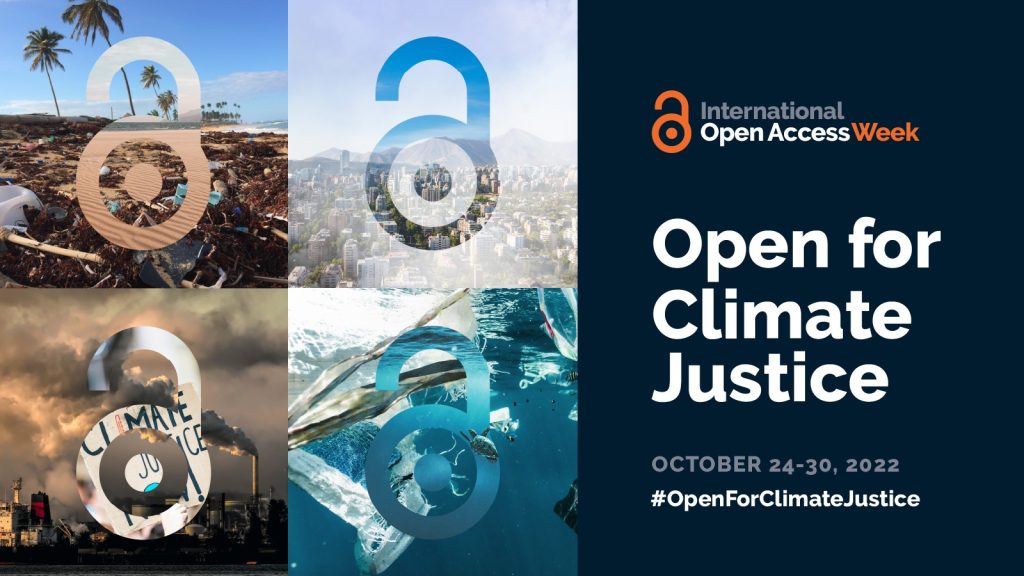The theme for this year’s International Open Access Week (October 24-30) is, “Open for Climate Justice.” The theme: “seeks to encourage connection and collaboration among the climate movement and the international open community. Sharing knowledge is a human right, and tackling the climate crisis requires the rapid exchange of knowledge across geographic, economic, and disciplinary boundaries.” Open  Access Week was created by the Scholarly Publishing and Academic Resources Coalition (SPARC) for the academic and research community to “learn about the potential benefits of Open Access, to share what they’ve learned with colleagues, and to help inspire wider participation in helping to make Open Access a new norm in scholarship and research.”
Access Week was created by the Scholarly Publishing and Academic Resources Coalition (SPARC) for the academic and research community to “learn about the potential benefits of Open Access, to share what they’ve learned with colleagues, and to help inspire wider participation in helping to make Open Access a new norm in scholarship and research.”
What is Open Access?
Open Access refers to “the free, immediate, online availability of research articles coupled with the right to use these articles fully in the digital environment. Open Access ensures that anyone can access and use these results—to turn ideas into industries and breakthroughs into better lives.” (SPARC*). See this video for a fuller explanation:
Open For Climate Justice
The theme of Open for Climate Justice acknowledges that the impacts of the climate crisis are not borne “equally or fairly, between rich and poor, women and men, and older and younger generations” (United Nations, 2019). The focus is on climate justice as a human rights issue and not merely a scientific one: “[climate justice] insists on a shift from a discourse on greenhouse gases and melting ice caps into a civil rights movement with the people and communities most vulnerable to climate impacts at its heart,” said Mary Robinson, former President of Ireland. This power inequity can impact the ability of communities to produce, disseminate, and use knowledge. Having Open Access to create pathways to ensure equitable knowledge sharing is a step in addressing the power inequities that are part of climate change and how we can respond to them.
Making scientific knowledge available is an important goal of Open Access. On August 25th, The White House Office of Science and Technology Policy (OSTP) updated U.S. policy to make the results of taxpayer-supported research immediately available to the American public at no cost or embargo.
Why is OA important to CU Libraries? We believe that open access to good quality information is essential for a free and democratic society. The virtue of justice is central to this ethical problem.
Things you can do to participate
- Attend OA Week events: See the list of worldwide events on the OA website.
- Advocate for Open Access. Advocate in your discipline for open access. See how you can transition a journal from subscription to open access.
- Publish your work in open access platforms. You can determine what journals are open access by checking the Directory of Open Access Journals (DOAJ).
- Adopt an open textbook. Students need a break from high textbook prices. Learn how to adopt or adapt a textbook from the Open Textbook Library. The Washington Research Library Consortium (Catholic University Libraries is a member) has a series of webinars on how to get started. Adopt a textbook today!
About SPARC
SPARC has been at the forefront of Open Access since 1998. They are “a non-profit advocacy organization that supports systems for research and education that are open by default and equitable by design.” See the activities planned for Open Access Week 2022.

Further Reading
OASIS. Developed at SUNY Geneseo’s Milne Library, Openly Available Sources Integrated Search (OASIS) is a search tool for discovering open content. OASIS currently searches open content from 114 different sources and contains 440,269 records.
Open Science video (In English): What is Open Science? Created by the Knowledge Network for University Libraries (Website in Dutch).
Transitioning Society Publications to OA.
UNESCO, Open Educational Resources (OER).
White House Office of Science and Technology Policy (OSTP). OSTP Issues Guidance to Make Federally Funded Research Freely Available Without Delay, August 25, 2022.
